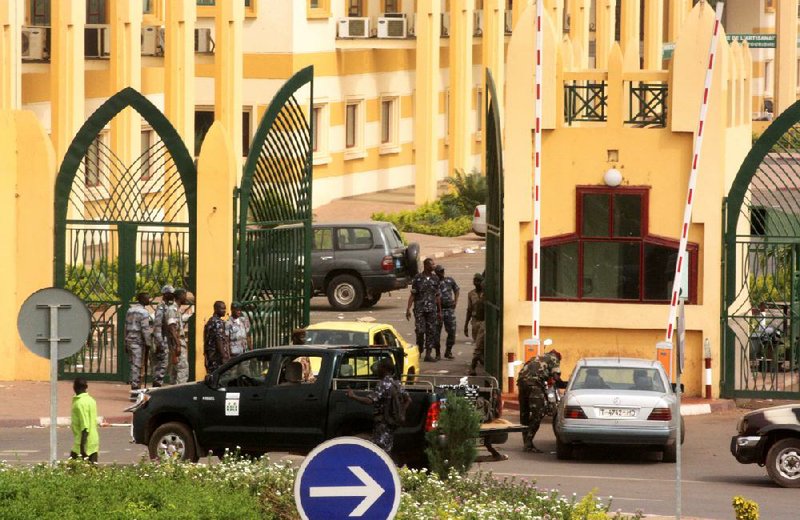BAMAKO, Mali — Drunken soldiers looted Mali’s presidential palace hours after they declared a coup Thursday, suspending the constitution and dissolving the institutions of one of the few established democracies in a troubled corner of Africa.
The whereabouts of President Amadou Toumani Toure, 63, who was just one month away from stepping down after a decade in office, could not be confirmed. The United States Embassy issued a statement dispelling rumors that he had sought refuge in its compound.
The soldier heading the coup said on state television late Thursday that Toure is “doing well and is safe.” Capt. Amadou Haya Sanogo declined to say where the ousted leader is being kept, and did not make clear whether the soldiers are holding him.
The scene in the normally serene capital was unsettling to those proud of Mali’s history as one of the few mature democracies in the region. Soldiers smelling of alcohol ripped flat-screen TVs, computer monitors, printers and photocopiers out of the presidential palace, carting them off in plain sight. Others in pickups zoomed across the broad avenues, holding beer bottles and firing automatic weapons.
The mutineers said they were overthrowing the government because of its mishandling of an ethnic Tuareg insurgency in the country’s north that began in January. Tens of thousands of Malian civilians have been forced to flee. The soldiers sent to fight the separatists have been killed in large numbers, often after being sent to the battlefield with inadequate arms and food supplies, prompting fierce criticism of the government.
The coup began Wednesday, after young troops mutinied at a military camp near the capital. The rioting spread to a garrison thousands of miles away in the northern town of Gao.
By evening, troops had surrounded the state television station in Bamako. At dawn Thursday, some 20 soldiers huddled behind a table, facing the camera. They introduced themselves as the National Committee for the Reestablishment of Democracy and the Restoration of the State, known by its French acronym, CNRDR.
“The CNRDR representing all the elements of the armed forces, defensive forces and security forces has decided to assume its responsibilities and end the incompetent and disavowed regime of Amadou Toumani Toure,” they said, reading from a statement. “The objective of the CNRDR does not in any way aim to confiscate power, and we solemnly swear to return power to a democratically elected president as soon as national unity and territorial integrity are established.”
The soldiers said they intended to hand over power to an elected government, though they made no mention of the fact that elections were supposed to be held April 29. More than a dozen candidates were expected to run. Toure was not in the race, as he has already served the maximum two terms.
Criticism of the coup was swift. France is suspending all government cooperation with Mali, except for aid. In Washington, State Department spokesman Victoria Nuland said officials were meeting to discuss whether to cut off the $137 million in annual U.S. assistance.
United Nations Secretary-General Ban Ki-moon said he “strongly condemned” the military takeover and “called on those responsible to refrain from any actions that could increase violence and further destabilize the country,” according to a statement.
And the body representing countries in the region, the Economic Community of West African States, called the coup “reprehensible.”
The coup is a major setback for Mali, a landlocked nation of 15.4 million which is dirt-poor but fiercely proud of its democratic credentials. Toure, a former parachutist in the army, rose to power in a 1991 coup. He surprised the world when he handed power to civilians, becoming known as “The Soldier of Democracy.” A decade later, he won the 2002 election and was re-elected in 2007.
“The situation is grave for our democracy and our republican institutions,” said Ali Nouhoum Diallo, the former president of Mali’s National Assembly. “We cannot approve the seizing of power through force.”
The last statement from the presidency came via Twitter from the government’s official account. “This is not a coup. It’s just a mutiny,” said a post late Wednesday.
But as the sound of heavy weapons rang out, soldiers encircled the palace. Reached by telephone, an officer at the palace who requested anonymity because he was not authorized to speak to the media said the president’s bodyguards had failed to fight the renegade soldiers when they burst in. They searched the grounds but could not find Toure, and there were conflicting reports Thursday about where he might be hiding.
The mutinous soldiers imposed a nationwide curfew, warning people to stay off the streets until further notice. A flight headed to Bamako was forced to U-turn after the borders were closed. At noon, soldiers were riding on scooters and in pickups shooting into the air, and local media reported casualties from stray bullets.
At midday Thursday, coup spokesman Lt. Amadou Konare ordered soldiers to stop randomly shooting, and called on the population to stay calm in a statement read on state television.
Information for this article was contributed from Dakar, Senegal, by Rukmini Callimachi; from Washington by Bradley Klapper and from the United Nations by Edith M. Lederer of The Associated Press.
Front Section, Pages 6 on 03/23/2012
